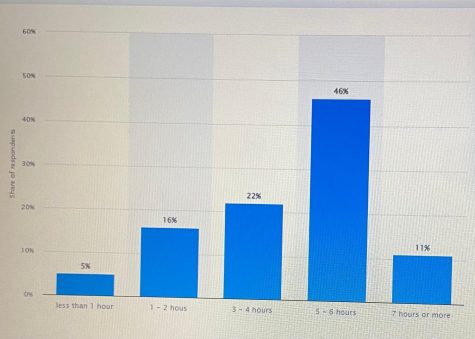PHONE OBSESSIONS – TEACHERS VS. STUDENTS
January 24, 2022
How many times have you checked your phone today? Most of you will say a lot, because let’s be honest we are always on our phones whether that be listening to music, answering text messages, or even just looking at the blank screen. You might even be in your bed on your phone right now reading this, but have you ever really thought about how being on your phone all the time has really affected your life?
Phones have been used around the world by many people and they use them for many different reasons. It could be to keep in contact with family, friends, or for school, but no matter what the reason is it can always turn into an obstruction and end up taking time away from your social life. 53% of young people in the United States now has phones just by the age of 11, and at that age it can be a problem while in class. When we got Mrs. Ward’s (English teacher) opinion on phones in the classroom she responded with, “teachers have a hard time competing with phones.” Even students have agreed with this statement. When we asked Nick and C. (underclassmen) the same question they said, “…students get distracted.”
Speaking of kids getting their phone at a young age, do you remember the age when you got a phone? I would bet it’s not as young as kids are getting them now. In a recent study 1 in 5 people have gotten their phone at age 8. When kids get a phone at that age they will learn to rely on it all the time, and then just like everyone else, they get obsessed with it, but at an age where they should be spending time outside and not staring at a screen. Many teachers and students seem to agree that kids should be getting them when they are older and when they are much more mature. When we asked Mr. James (AP U.S. History teacher) how he feels about kids getting their phone at such a young age he answered with, “I don’t think kids should have a phone until 9th grade, I think they aren’t really mature enough in middle school to handle a phone.” We got a different response from a senior, Taylor Turley, “Around middle school I think would be a good age.”
Phones seem to always be around, and it feels like nowadays we see everyone with a Phone. Most people cling onto their phone as if it were a security blanket, something that makes them feel secure. It’s kind of like that stuffed animal that you would carry around as a child and refuse to let go because it made you feel happy or safe. Phones are like that for everyone, well mostly everyone. When you are in the store, the park, or the hallways of your school you see a majority of people with their phone in their hand. But are they using it? No. They have a tight grip on the thing that they feel completes them, and one second withouthaving it on them they go crazy. Teachers and students seem to have a different view on this though. Ms. Ward had told us that she believes, “Students are generally on their phones”, but the student, Taylor Turley said the opposite, “I think it’s a safety blanket…it is comforting.” We got one more opinion on this though. The guidance counselors, Mrs. Thorp and Mrs. Cathro had agreed with both Ms. Ward and Taylor, and said, “It’s some of both…for some students it’s a security blanket, and others ones check their HAC.”
 If you would say that students’ screen times would be a lot higher than adults, then you would be correct. When we took a survey, we saw that the average for students was around 6 hours a week, but multiple students have said it had gone down ever since school had started back up. Most staff members have said 2-3 hours a week, but we did have one outlier amongst the staff, and surprisingly it was Mr. Weber with 7 hours a week!
If you would say that students’ screen times would be a lot higher than adults, then you would be correct. When we took a survey, we saw that the average for students was around 6 hours a week, but multiple students have said it had gone down ever since school had started back up. Most staff members have said 2-3 hours a week, but we did have one outlier amongst the staff, and surprisingly it was Mr. Weber with 7 hours a week!
Within your average screen time, the most time spent might have been through texting. Have you checked who was the last person you texted? Or how much you text a certain person? When it comes down to it you most likely text someone more than you actually talk to them. Sure, it could have been during class or during lunch for some people, but most of the time you only ever talk to that “friend” through text. Just over one in ten (12%) say that they send or receive more than 200 messages on an average day—that equals 6,000 or more messages per month.” (https://www.pewresearch.org/internet/2011/09/19/how-Americans-use-text-messaging/). Of course, texting can be helpful – like talking to a friend or relative who lives too far away. Even during quarantine it was a great thing to keep in touch with your friends. But you need to know when to cross the line, plan to hang out and instead of being on your phones the whole time go outside or play a game, just to even talk.
Along with texting being one of the most common things done on a phone, a lot of time spent is also on social media, whether that be Instagram, SnapChat, TikTok, or any other app. When you are looking at other’s posts it could really wear you down and you may start to feel self-conscious about the way you look, dress, or even stuff you do. Ever since social media really started to become a popular thing it has taken a toll on people’s mentality about anything. From the source, GuardChild (https://www.guardchild.com/social-media-statistics-2/) “41% of teens had a negative experience.” and “22% of teens lost their friendship with someone due to actions on social media sites.” A lot of the time social media is fake and comparing your lives to someone else’s is almost pointless. Social media can be a good outlet to just relax and temporarily forget about your problems, but you can’t let it take a negative turn.
Along with social media having both positive and negative effects, so does just being on your phone in general. Starting with the positive effects, phones can help you be more connected to friends and family. They can also help you with schoolwork and knowing what is going on in the world. Also, if we are being honest, they help you in awkward situations or just situations that you don’t want to be a part of. Even though phones help you in many great ways they also definitely have their flaws. The more of an addiction to your phone you have the worse the effects on you will be. Although your phone can help you with your homework, it can be even more of a distraction. As said before, your phone can have a major effect on your mental health. One of the most negative effects it can have on you is your sleep schedule, and the quality of that sleep.
Now it has been common knowledge that phones have always been a distraction for us, be it that we can’t concentrate in class or forget to do something important. How many times have you said, “I’ll do it after this video?” Our phones are of great use as we established but also can mess up our schedules and how we do things. It can start out small, you sleep an hour later than normally or you have 1-2 missing assignments. But it can turn into something even worse like completely ignoring schoolwork, hardly getting any sleep, or just making you stay inside for long periods of time. So instead try to make boundaries with yourself and your phone don’t overdo it, set screen-times, or just go outside and leave your phone behind.
There are many mixed feelings about phones, positive and negative, but it’s all on how you manage yourself with it. The next time you feel the urge to pick up your phone maybe think about what you could do instead or the consequences that might happen in the long run.

